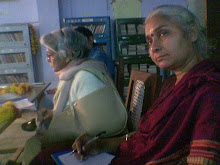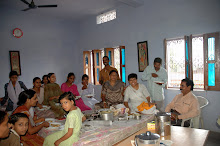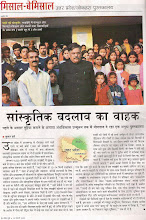लघु पत्रिका (लिटिल मैगजीन) आन्दोलन मुख्य रूप से पश्चिम में प्रतिरोध (प्रोटेस्ट) के औजार के रूप में शुरू हुआ था. यह प्रतिरोध राज्य सत्ता, उपनिवेशवाद, साम्राज्यवाद या धार्मिक वर्चस्ववाद– किसी के भी विरुद्ध हो सकता था. लिटिल मैगजीन आन्दोलन की विशेषता उससे जुडे लोगों की प्रतिबद्धता तथा सीमित आर्थिक संसाधनों में तलाशी जा सकती थी. अक्सर बिना किसी बडे औद्योगिक घराने की मदद लिये बिना, किसी व्यक्तिगत अथवा छोटे सामूहिक प्रयासों के परिणाम स्वरूप निकलने वाली ये पत्रिकायें अपने समय के महत्वपूर्ण लेखकों को छापतीं रहीं हैं. भारत में भी सामाजिक चेतना के बढने के साथ-साथ बीसवीं शताब्दी के उत्तरार्ध में लघु पत्रिकायें प्रारम्भ हुयीं. 1950 से लेकर 1980 तक का दौर हिन्दी की लघु पत्रिकाओं के लिये बहुत ही महत्वपूर्ण रहा. यह वह दौर था जब नई- नई मिली आजादी से मोह भंग शुरू हुआ था और बहुत बडी संख्या में लोग विश्वास करने लगे थे कि बेहतर समाज बनाने में साहित्य की निर्णायक भूमिका हो सकती है. बेनेट कोलमैन & कम्पनी तथा हिन्दुस्तान टाइम्स लिमिटेड की पत्रिकाओं-धर्मयुग, साप्ताहिक हिन्दुस्तान, सारिका, कादम्बनी, दिनमान, और माधुरी जैसी बडी पूंजी से निकलने वाली पत्रिकाओं के मुकाबले कल्पना, लहर, वाम, उत्तरार्ध, आलोचना, कृति, क ख ग, माध्यम, आवेश, आवेग, संबोधन, संप्रेषण, आरम्भ, ध्वज भंग , सिर्फ , हाथ, कथा, नई कहानियां, कहानी, वयं, अणिमा जैसी पत्रिकायें निकलीं जो सीमित संसाधनों , व्यक्तिगत प्रयासों या लेखक संगठनों की देन थीं. इन पत्रिकाओं का मुख्य स्वर साम्राज्यवाद विरोध था और ये शोषण, धार्मिक कठमुल्लापन, लैंगिक असमानता, जैसी प्रवृत्तियों के विरुद्ध खडी दिखायीं देतीं थीं. एक समय तो ऐसा भी आया जब मुख्य धारा के बहुत से लेखकों ने पारिश्रमिक का मोह छोडकर बडी पत्रिकाओं के लिये लिखना बन्द कर दिया और वे केवल इन लघु पत्रिकाओं के लिये ही लिखते रहे. एक दौर ऐसा भी आया जब बडे घरानों की पत्रिकाओं में छपना शर्म की बात समझा जाता था और लघु पत्रिकाओं में छपने का मतलब साहित्यिक समाज की स्वीकृति की गारंटी होता था. आज राष्ट्रीय एवं ग्लोबल कारणों से न तो लघु पत्रिकाएं निकालने वालों के मन में पुराना जोश बाकी है और न ही उनमें छपना पहले जैसी विशिष्टता का अहसास कराता है फिर भी लघु पत्रिकाओं में छपी सामग्री का अपना एक ऐतिहासिक महत्व है . हिन्दी साहित्य के बहुत सारे विवाद, आन्दोलन, प्रवृत्तियों को निर्धारित करने वाली सामग्री और महान रचनायें इन लघु पत्रिकाओं के पुराने अंकों में समाई हुयीं हैं. इनमें से बहुत सारी सामग्री कभी पुनर्मुद्रित नहीं हुयीं. साहित्य के गंभीर पाठकों एवं शोधार्थियों के लिये इनका ऐतिहासिक महत्व है.
श्री रामानन्द सरस्वती पुस्तकालय ने इस महत्वपूर्ण खजाने को एक साथ उपलब्ध कराने के लिये अपने प्रांगण में वर्ष 2004-2005 में लघु पत्रिका केन्द्र की स्थापना की है. इस केन्द्र में 250 से अधिक लघु पत्रिकाओं के पूरे अथवा कुछ अंक उपलब्ध हैं. कोई भी शोधार्थी यहाँ पर आकर इस संग्रह की पत्रिकाओं का अध्ययन कर सकता है और आवश्यकता पडने पर फोटोकॉपी ले जा सकता है. पुस्तकालय शोधार्थियों के रुकने की निशुल्क व्यवस्था भी करता है. इस सम्बन्ध में कोई भी सूचना सुधीर शर्मा से टेलीफोन नम्बर- 05466-239615 अथवा 9452332073 से प्राप्त की जा सकती है.
sri ramanand saraswati pustkalaya
Sunday, August 24, 2008
Those who visited Library
Writers -
Trilochan Shastri, Kamleshwar , Namwar Singh, Shreelal Shukla, Vishnu Kant Shastri, Mamta Kalia, Ravindra Kalia, Se Ra. Yatri, Asgar Wazahat, Markandey, Neel Kant, Shekhar Joshi, Doodh Nath Singh, Neelabh, Parmanand Srivastava, Kedar Nath Singh, Kashi Nath Singh, Abid Surti, Namita Singh, Kunwar Pal Singh, Hari Pal Tyagi, Ramesh Upadhya, Avadhesh Pradhan, Madhu Kankaria, Lal Bahadur Verma, Harish Chandra Agrawal, Badri Nath ,Badri Narayan, Ganga Prasad Vimal, Vikas Narain Rai,Shambhoo Nath , Dhananjay, Shambhu Gupta, Arvind Tripathi, Akhilesh, Virendra Yadav, Shivmurti, Tejinder, Bharat Bhardwaj, Suraj Paliwal, Rajendra Rajan, Alpana Mishra,Rati Agnihotri, Sadhana Agrawal, Upendra Kumar, Kamala Prasad, Rajendra Sharma, P.N.Singh, Sri Prakash Shukla, Krishna Mohan, Shalendra Pratap Singh, Ajay Tiwari, Ram Kumar Krishak, Ramanika Gupta, Vachaspati, Kanwal Bharati, Bhagwan Das Morwal, Prem Pal Sharma, Shankar, Abhai, Narmadeshwar, Priya Darshan Malviya, Jai Prakash Dhoomketu Anil Rai, Chauthi Ram Yadav, Nirmala Putul, Mrityunjay, Prahlad Agrawal, Hariom, Yash Malviya, Rohini Agrawal, Vivek Nirala, Kripa Shankar Chaubey, Neelam Shankar Pandey, Rohitshva, Ravi Shankar Pandey, Ram Kamal Rai, Vasant Nirgune, and Prakash Tripathi.
Film/Theatre personalities
Devendra Raj Ankur, Shabana Azmi, Teejan Bai,Sagar Sarhadi, Surya Mohan Kulshreshth, Yugal Kishor, Jitendra Raghuvanshi, Sachin Tiwari, Mridula Bhardwaj, Vidhu Khare, Vijay Kumar, Sanskar Desai, Munni Gandharv, Gobind Yadav, Meeta Mishra, Shamshul Islam, Neelima , Abhishek Pundit, Mamata Pundit,
Social Activists-
Acharya Ram Murti, Teesta Sitalvad, Medha Patkar, Asgar Ali Engineer, Arundhati Dhuru,Roop Rekha Verma, Sandeep Pandey,Prof. Om Prakash Malviya, Prof. Deepak Malik, Nasiruddin, Prof.Ramesh Dikshit,Muniza, Naish, Shakeela, Sarvesh (photographer)
Trilochan Shastri, Kamleshwar , Namwar Singh, Shreelal Shukla, Vishnu Kant Shastri, Mamta Kalia, Ravindra Kalia, Se Ra. Yatri, Asgar Wazahat, Markandey, Neel Kant, Shekhar Joshi, Doodh Nath Singh, Neelabh, Parmanand Srivastava, Kedar Nath Singh, Kashi Nath Singh, Abid Surti, Namita Singh, Kunwar Pal Singh, Hari Pal Tyagi, Ramesh Upadhya, Avadhesh Pradhan, Madhu Kankaria, Lal Bahadur Verma, Harish Chandra Agrawal, Badri Nath ,Badri Narayan, Ganga Prasad Vimal, Vikas Narain Rai,Shambhoo Nath , Dhananjay, Shambhu Gupta, Arvind Tripathi, Akhilesh, Virendra Yadav, Shivmurti, Tejinder, Bharat Bhardwaj, Suraj Paliwal, Rajendra Rajan, Alpana Mishra,Rati Agnihotri, Sadhana Agrawal, Upendra Kumar, Kamala Prasad, Rajendra Sharma, P.N.Singh, Sri Prakash Shukla, Krishna Mohan, Shalendra Pratap Singh, Ajay Tiwari, Ram Kumar Krishak, Ramanika Gupta, Vachaspati, Kanwal Bharati, Bhagwan Das Morwal, Prem Pal Sharma, Shankar, Abhai, Narmadeshwar, Priya Darshan Malviya, Jai Prakash Dhoomketu Anil Rai, Chauthi Ram Yadav, Nirmala Putul, Mrityunjay, Prahlad Agrawal, Hariom, Yash Malviya, Rohini Agrawal, Vivek Nirala, Kripa Shankar Chaubey, Neelam Shankar Pandey, Rohitshva, Ravi Shankar Pandey, Ram Kamal Rai, Vasant Nirgune, and Prakash Tripathi.
Film/Theatre personalities
Devendra Raj Ankur, Shabana Azmi, Teejan Bai,Sagar Sarhadi, Surya Mohan Kulshreshth, Yugal Kishor, Jitendra Raghuvanshi, Sachin Tiwari, Mridula Bhardwaj, Vidhu Khare, Vijay Kumar, Sanskar Desai, Munni Gandharv, Gobind Yadav, Meeta Mishra, Shamshul Islam, Neelima , Abhishek Pundit, Mamata Pundit,
Social Activists-
Acharya Ram Murti, Teesta Sitalvad, Medha Patkar, Asgar Ali Engineer, Arundhati Dhuru,Roop Rekha Verma, Sandeep Pandey,Prof. Om Prakash Malviya, Prof. Deepak Malik, Nasiruddin, Prof.Ramesh Dikshit,Muniza, Naish, Shakeela, Sarvesh (photographer)
Subscribe to:
Comments (Atom)
Women dare to ask question:
The mundane and routine life of Prabhawati had always been on the receiving end. Poverty, ill treatment of in laws and regular beating by a drunkard husband Bhagwat were all she could remember till she met Kusum and Pushpa, two activists on gender issues. SRSP, with support of OXFAM, has initiated a campaign against gender violence in fifteen surrounding villages. Prabhawati's village Sahnupur is one among these. She learnt the art of protest during interaction with Kusum and Pushpa and that was the beginning of the end of accepting cruelty without asking questions. "How dare you ask question" was the reaction of Bhagwat, with a sense of disbelief on his face, one day when he slapped her and a defiant Prabhawati asked uncomfortable questions. Since then Prabhawati never looked back. She giggles while narrating, before women participants in a discourse on gender, how she reacts to the violent behaviour of her husband and how much he fears raising his hands on her because he knows that she will pay him back in the same coins. Prabhawati is one of many women of different age groups who regularly attend various capacity building programmes and discussions organised by SRSP. These exposures have taught them to ask questions and not to accept violence against them in different forms and at various levels.
Letters from a Goa prisoner to writers: Sumant Bhattacharya in Indian Express of 18 th January 1998
NEW DELHI, January 17: From his tiny cell in Goa's Central Jail, Sudhir Sharma, Inmate No 797, has been fighting a long and lonely battle: he wants to read. The Constitution and the Supreme Court say he has the right to do so, his prison authorities say no.Sharma, a former addict, was arrested in 1993 and sentenced to a 10-year jail term under the Narcotics Act. While in prison, one day, a fellow inmate showed him a copy of Pahal, a monthly Hindi literary magazine. It was this that, Sharma says, gave him a reason to live.
He wrote to Pahal editor, noted Hindi writer Gyanranjan, who sent him his books. They reached the jail but authorities said he couldn't read them. The books were sent back and Sharma was moved to a sub-jail, in Vasco, where, he says, the conditions are worse.
Still, he keeps writing letters, to Gyanranjan, Hindi novelist and DIG of Border Security Force, Vibhuti Narain Rai; authors Nirmal Varma, S R Yatri and Asghar Wajahat. These letters aren't sent through ``official channels'', he smuggles them out, sometimes through an inmate on his way to the hospital, a friendly warden or an inmate's relative. In his latest letter to Rai on December 10, 1997, Sharma says he's perhaps paying for raising his voice.
The story of his life, as told through his letters: Once a student of Delhi University, Sharma left home for Mumbai. He began working for the underworld don Karim Lala's nephew Samad Khan, fell in love with a ``penfriend'' from Jodhpur. Things changed when Samad Khan was killed and his girlfriend ditched him. Sharma became an addict and began to peddle drugs until he landed in jail.
He clocked his days in despair until he read Pahal. ``Pahal ke ank ne meri zindagi mein pranvayu ka sanchar kiya,'' he writes in a letter to Rai. (Just one issue of Pahal gave me a fresh lease of life). He goes on to thank Gyanda (Gyanranjan) for accepting a prisoner as a reader. ``Thank you for agreeing to share your books with a criminal. I know I have done something wrong but I am conscious. Don't I have the right,'' he asks, ``to know what's going on, to be sensitive?''
Books and magazines came pouring in which jail authorities confiscated. He also wrote to Kiran Bedi. In a letter, he says he believes that his persecution by the jailer was largely due to his attempt to spill the beans in the letter to Bedi.
The IG (Prison), Goa, and the superintendent of the Central Jail in Aguada, quoted the jail manual to justify their action. In a letter to Rai dated July 8, 1996, the superintendent says:
"In view of Rule 17 of the Goa Daman and Diu Prisons (Facilities to the prisoners) Rules 1968, the parcel which was sent by you was refused by this jail."
According to this rule, prisoners' mail, both incoming and outgoing, "shall be carefully censored." And a prisoner may be asked to give "a list of persons with whom he is likely to correspond during his period of imprisonment. As far as practicable, this list shall be scrutinised."
Jail authorities claim that since these authors' names don't figure in this list, he cannot receive anything from them.
This despite a 1979 ruling by a Supreme Court bench comprising Justices V R Krishna Iyer, R S Pathak and O Chinnappa Reddy. The judges had said: "No prisoner can be personally subjected to deprivations not necessitated by the fact of incarceration and the sentence of the court. All other freedoms belong to him, to read and write... to creative comforts... to movement within the prison campus subject to the requirements of discipline and security, to the minimal joy of self-expression, to acquire skills... all other fundamental rights tailored to the limitations of imprisonment."Speaking to The Indian Express, G H Kenaudekar, additional Deputy Collector and Deputy IG (Prison), Goa north, says: "As per rules, books will not be given to prisoners but will be kept with jail authorities." When told of the Supreme Court's ruling, he says that probably the jail administration is not aware of the decision.
Ironically, the books sent to Sharma by Kiran Bedi, who was given the Magsaysay award for reforms in Tihar jail, were also returned. Says Bedi: "The Goa jail administration has overlooked the verdict and directions of the Supreme Court. It should be brought to book for this." Until that happens, Inmate No 797 will keep waiting -- and writing.















.jpg)












